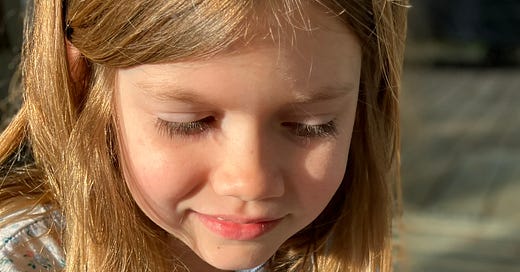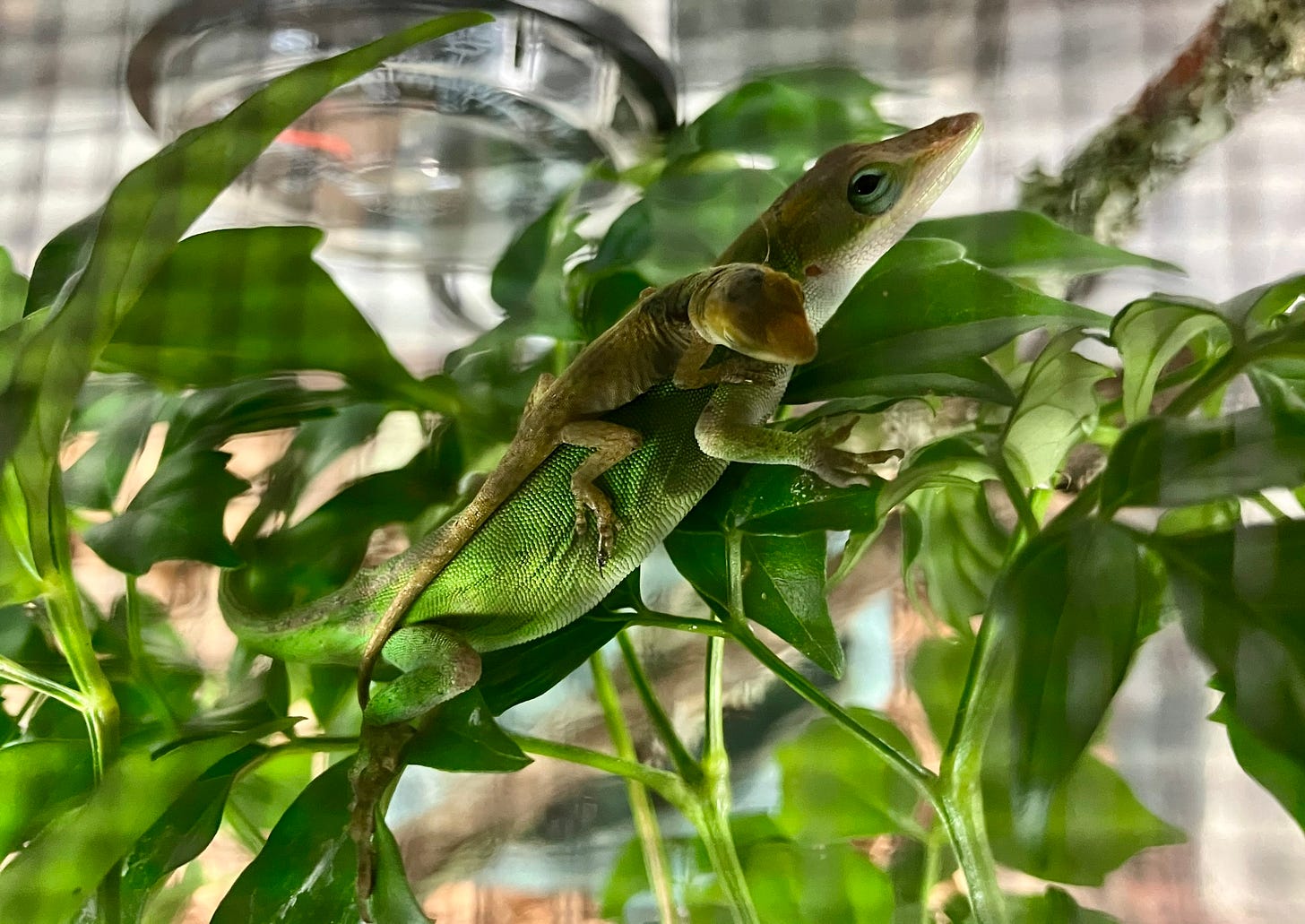My daughter’s epistemological concerns began at a very young age. Like every child, the questioning began as soon as she could speak but, like everything else she does, with unprecedented relentlessness. There were questions of time, questions of science, questions of definition, questions about questions. Each time an answer was given, her response was a question addendum: How do you know? Your birthday is in August. How do you know? We’re having hamburgers for dinner. How do you know? It will be cold today, so you need a jacket. How do you know?
No answer is satisfactory. So, about a year ago I adopted this rejoinder: You know through divine revelation, valid logic, and direct observation. Moooooom she moans. She's not wrong to moan; of late, I have realized that it is partial, misleading answer. Divine revelation, valid logic, and direct observation are ways of knowing truth. But do I want her to think that truth is all that there is to know? And that the reason is the only organ of knowing?
Though she is not aware, she is already an expert in knowing. Take, for instance, her green anole obsession. As it warmed up, she spent many free hours catching tree frogs and green anoles. They became my frequent visitors; every few minutes she would burst into my office, interrupting my writing to introduce me to an anole that looked just exactly like the last anole. Then, to resume work, I must participate in the anole liturgy: affirming “yes, he is cute,” petting his little lizard head, then telling him goodbye. Thinking myself clever, I thought, “If I let her keep an anole, she can turn all affections towards a particular one and I will not be interrupted every few minutes. How hard can it be?”
I should have learned by now that an idea ending in "how hard can it be?" is an idea that will involve a great deal of trouble. Lizards, as it turns out, are quite needy. In addition to a terrarium, they need special heating and lighting and misting and gages. They also need to eat. So, then we needed a second enclosure for crickets who cannot, I found, survive outdoors in the Florida heat and humidity. In order to be healthy food for the lizards, the crickets must be gutloaded (fed a special food), then dusted with vitamin powder. It is all very involved for a "free pet". But no one has ever been loved quite as well as Frodo. She tells him goodnight and good morning and not to be afraid during the thunderstorms.
It is not good for Frodo to be alone. One lizard was not enough - she wanted a lizard family. Pretty sure Frodo was male, she found him a helpmeet, Shadowfax. Pretty sure Shadowfax was a female, there was now the possibility of either a battle to the death for territory or a new brood of lizards. And sure enough, little time passed before she came to me to announce that she couldn't change out the substrate because she didn't want to disturb the eggs. I was stunned. I wasn't sure we could even keep one alive or get the sexes right much less raise a lizard family. But sure enough, last week we met baby Shuffler. And there are TEN more eggs waiting to hatch.
If you wanted to teach some students about anolis carolinensis, what would you do? In a typical classroom, you might start with a taxonomic rank and then work together to label a diagram. In a neoclassical classroom, you would give out a card with a picture of a green anole and some important facts for memorization. In a Charlotte Mason classroom, you would read a living book about green anoles with beautiful water-colored illustrations, and then narrate. But will they know an anole? My daughter has done none of these things, but she has loved and has known. She can do this naturally because she was born with the propensity to know in a way that I have not yet managed to spoil - poetically.
Poetic knowledge is an intuitive, non-analytical way of knowing. It is gained through poetic experience, a sensory-emotional experience of reality. It is “a natural human act, synthetic and penetrating, that gets us inside the thing experienced.”1 It is spontaneous and whole and the root of education. How does this work? The beginning and the end of poetic knowledge is love. This kind of knowledge derives from love of the thing and love of the thing is connected to Reality. Can you love a taxonomic classification? Can you love a diagram? Can you love the concept of thermoregulation? I wager not. But you can love Frodo, Shadowfax, and Shuffler. And because you care, you can notice. Green anoles eat mealworms in lizard pamphlets, but not in real life. They don’t actually drink from their water bowl but instead from water droplets on the walls of the enclosure. Breeding season is in the spring, and one female will lay a pile of eggs. She buries the eggs slightly for warmth, and her young hatch self-sufficient. You could tell me these things every year in science class, but I would never remember. But a few months with Frodo, and I will not forget.
To say that poetic knowledge begins and ends in love is another way to say that poetic knowledge begins and ends in the body. We have learned about Frodo and his family through our faculties of sense perception. Sense perception enters the memory, and when the memories are repeated, we have experience. Aristotle explains,
And from experience, or from the whole universal that has come to rest in the soul (the one apart from the many, whatever is one and the same in all those things), there comes a principle of skill and of understanding—of skill if it deals with how things come about, of understanding if it deals with what is the case.2
Through the sensory experience of the particulars, the whole universal has come to rest in our souls. What has this end to do with the body? With love?
From Augustine and antiquity, we know that education is to teach us to love what we ought. It is not to get a score or to get a job but to have our affections rightly ordered. Rightly ordered affections moves the whole person toward the seamlessness of body and soul that was rent at the Garden of Eden. The affections, according to Aquinas, move us away from things we fear and towards things that we desire. They are like rivers, powerful forces that, rightly channeled, are the stuff of life. A true education moves us to desire and fear what we ought. It is, in essence, the work of sanctification.
Through Frodo, I see my daughter taking dominion of a tiny little group of beasts of the earth. She is learning a little about motherhood, that there is such a thing as too much mothering. She has painted beautiful watercolor portraits of Frodo, and I suspect I am raising a naturalist. And I see that it is good.
Through Frodo, I have begun to care a bit more about the natural order of things and the delicacy of a life cycle and an eco-system. I have thought a bit more about animal instincts and wonder what can account for lizards cuddled up together fast asleep. Up close, I see that they are much more beautiful than I thought, such a brilliant, living green. Most of all, I am reminded how much I can learn from my daughter, a tightly coiled spring of love and poetic energy. She knows how to know. Just ask Frodo.
James S Taylor, Poetic Knowledge: The Recovery of Education (Albany, NY: State University of New York Press, 1998), 6.
Aristotle, Posterior Analytics. The Complete Works of Aristotle, ed. Jonathan Barnes, trans. W. D. Ross (Princeton University Press, 1995), https://www.everand.com/read/282228476/The-Complete-Works-of-Aristotle-The-Revised-Oxford-Translation-One-Volume-Digital-Edition#__search-menu_602150.






Love this! It resonates with so much of what I have been trying to articulate about learning and knowledge.